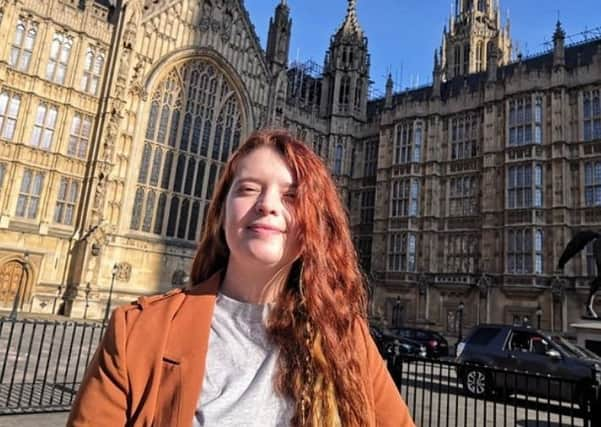NI rights activist defends growing campaign over Irish citizenship


Co Londonderry woman Emma DeSouza – whose campaign has won the support of numerous politicians, lawyers and human rights campaigners – has warned that a change in the UK’s immigration rules means that NI-born Irish nationals will not be considered an EEA (European Economic Area) national in the UK.
Mrs DeSouza claims that, as a result, Irish citizens living in the UK will be unable to apply for settled status post-Brexit and will be exempt from retaining their full rights as EU citizens.
Advertisement
Hide AdAdvertisement
Hide AdShe also asserted that the birthright provisions of the Belfast Agreement are being undermined.
There are even plans for a rally at Belfast City Hall on April 20, which she described as a “cross-community” event.
The author, who goes by the name Willow, also approached the News Letter in his attempt to debunk her claims, which he branded “irresponsible and alarmist”.
Advertisement
Hide AdAdvertisement
Hide AdSpeaking to the News Letter, Mrs DeSouza said her campaign was about “supporting “families affected by the Home Office interpretation of the Good Friday Agreement”.
She added: “They are my motivation and there is nothing irresponsible about standing up for those that can’t.”
In a series of questions, we asked Mrs DeSouza to respond to several key points raised by Willow.
Firstly, she was asked to address Willow’s claim that there has in fact been no change to the status of Irish citizens in the UK.
Advertisement
Hide AdAdvertisement
Hide AdThe “redefinition” of an EEA national referred to by Mrs DeSouza is contained in a document presented to Parliament on March 7, entitled ‘Statement of Changes in Immigration Rules’.
She told the News Letter: “Under the definition of an EEA national, the change was highlighted in bold, to represent that it is in fact a change.
“This change was brought to my attention by prominent migration barrister Simon Cox, who revisited the text of changes after I expressed concern over a written parliamentary response from immigration minister Caroline Nokes that alluded to the restriction of dual British/Irish citizens.
“Until that point, many among the legal community expected dual EU citizens to be able to rely on their EU rights within the UK, which is why the change in the document garnered such a strong response from human rights groups, academics and the legal community.”
Advertisement
Hide AdAdvertisement
Hide AdWe also asked Mrs DeSouza about her claim that the EU settlement scheme is “the only way to access and retain EU rights and benefits as laid out in the withdrawal agreement”.
In his remarks to this newspaper, Willow rejected Mrs DeSouza’s interpretation, stating: “EU rights and benefits can only be granted by the EU. The UK cannot and does not grant these rights, and once it leaves will, sadly, no longer even have any influence over the granting of them.”
Dismissing Willow’s statement as “very confused”, Mrs DeSouza replied: “The continuation of EU rights and benefits is addressed in the withdrawal agreement.
“Chapter two of the agreement covers these rights, the EU settlement scheme is the UK’s enactment of this chapter and provides the continued rights and benefits to EU citizens within the UK.
Advertisement
Hide AdAdvertisement
Hide Ad“The UK cannot strip or remove EU rights but it can of course decide who is a British citizen and legislate on how it is to treat its own citizens domestically. This is what we’re seeing, a clause which exempts those who are British by birth from retaining the EU rights being offered through the settlement scheme.
“Why this has become an issue in NI is that we are unique within the UK. We have a birthright to be accepted as Irish or British or both. It has come to light, through the Brexit process, that this right under the Good Friday Agreement was not implemented into UK domestic law.”
However, Willow argued that as a result of Brexit, it is British citizens not Irish citizens who will lose EU rights.
He told the News Letter: “Irish citizens will, as a result of the Ireland Act 1949, continue to enjoy the same UK rights as UK citizens.
Advertisement
Hide AdAdvertisement
Hide Ad“This is something for Irish citizens to welcome and makes Emma’s desire to apply to the settlement scheme somewhat absurd: applying for permission to settle in the UK would represent a diminution in rights when compared to the current automatic right of residence.”
Addressing this point, Mrs DeSouza claimed it is widely accepted that the Ireland Act 1949 is “insufficient and does not provide or guarantee a special immigration status for Irish citizens in the UK”.
She added: “A basic concern is that the exemption from immigration control in the Ireland Act 1949 is no longer in place because of the fundamental shift in the immigration regime brought about by the Immigration Act 1971.
“At the time this change to the immigration rules was irrelevant as both Ireland and the UK were members of the EU. However, with the removal of EU law and a lack of legislation to protect Irish citizens from immigration controls as laid out in the Immigration Act 1971, Irish citizens will be vulnerable, unless they secure rights under the EU settlement scheme or the UK rushes through legislation on the Common Travel Area.”